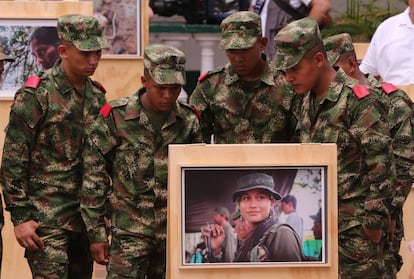Colombia and FARC sign revised peace deal
Text includes some key demands of opponents, who say it still doesn’t go far enough
Colombian President Juan Manuel Santos and Rodrigo Londoño, the leader of the Revolutionary Armed Forces of Colombia, or FARC, signed a new peace agreement Thursday, despite lingering opposition in many quarters. The accord was reached on November 12 following an October referendum in which the country voted narrowly to reject a peace agreement reached in September.

Voters opposed the original peace deal, signed after four years of talks and aimed at ending half a century of conflict, for its perceived leniency toward FARC fighters.
The revised peace deal will not be put to a country-wide vote. Instead, President Santos has said it will go to Colombia’s Congress for ratification.
The changes require the FARC to be more open about its drug trafficking and kidnappings
The new accord introduces some 50 changes intended to assuage critics led by still-powerful former president, Álvaro Uribe. He has demanded it be put to another referendum.
“We’re going to take out everything that threatens the family, that threatens the Church and we are going to look for a sentence, a word, that doesn’t frighten away believers,” President Santos – who won the 2016 Nobel Peace Prize for his work in negotiating the initial peace deal – had said of the revised agreement.
His words that came in response to Colombia’s powerful Evangelist movement, which encouraged its 10 million members to reject the peace deal on the grounds it “breached Evangelical principles such as the family when it compares the values of womanhood with those groups [a reference to the LGBTI community],” in the words of Christian leader Edgar Castaño.
In the run-up to the October referendum, opponents to the peace accord had also said it would pave the way to Londoño becoming president, despite near-universal rejection of the FARC, according to surveys. Under the new agreement, however, the FARC will retain its five seats in the Senate and an equal number in Congress, but the financing it receives as a political party will be proportionate to its support rather than the previous 10% of the amount set aside by the state for funding parties.There is widespread opposition to the idea that former guerrillas guilty of war crimes be allowed to take office.
The peace agreement will no longer be enshrined in the Constitution, although there will be an amendment preventing future presidents from overturning it.
The main complaint was the original plan did not include sufficient punishment for FARC fighters. The five-decade battle has left more than 220,000 Colombians dead, forced 360,000 to flee the country and displaced up to eight million Colombians from their homes.
The revised peace deal will not be put to a country-wide vote
Uribe has demanded that some members of the FARC serve prison sentences for their crimes. Instead, the Peace Tribunal will decide where and for how long former guerrillas will serve their terms, most likely for a transitional period on farms.
The government has also agreed to forgo the participation of foreign jurists in a special tribunal, which would be the centerpiece of the transitional justice system, and have only Colombian judges hear cases. It also established that the tribunal would consider new cases during its first two years and seek to conclude its work within a decade. The new agreement would explicitly give Colombia’s highest court the authority to review the tribunal’s decisions.
In an important new concession, the FARC has explicitly agreed to declare and surrender all assets, which will be used to compensate victims of the conflict. The new draft also makes clear that land reform initiatives in the original text will protect the rights of landowners, who will not face arbitrary expropriation of property.
The changes require the FARC to be more open about its illicit activities such as drug trafficking and kidnappings for ransom to support its resistance. It adds that accusations of drug trafficking will be investigated on a case-by-case basis. “Conduct that facilitated, supported, or financed the conflict” and that did not involve “personal enrichment, or that results in war crimes or genocide” will be the subject of an amnesty..
English version by Nick Lyne.
Tu suscripción se está usando en otro dispositivo
¿Quieres añadir otro usuario a tu suscripción?
Si continúas leyendo en este dispositivo, no se podrá leer en el otro.
FlechaTu suscripción se está usando en otro dispositivo y solo puedes acceder a EL PAÍS desde un dispositivo a la vez.
Si quieres compartir tu cuenta, cambia tu suscripción a la modalidad Premium, así podrás añadir otro usuario. Cada uno accederá con su propia cuenta de email, lo que os permitirá personalizar vuestra experiencia en EL PAÍS.
¿Tienes una suscripción de empresa? Accede aquí para contratar más cuentas.
En el caso de no saber quién está usando tu cuenta, te recomendamos cambiar tu contraseña aquí.
Si decides continuar compartiendo tu cuenta, este mensaje se mostrará en tu dispositivo y en el de la otra persona que está usando tu cuenta de forma indefinida, afectando a tu experiencia de lectura. Puedes consultar aquí los términos y condiciones de la suscripción digital.









































